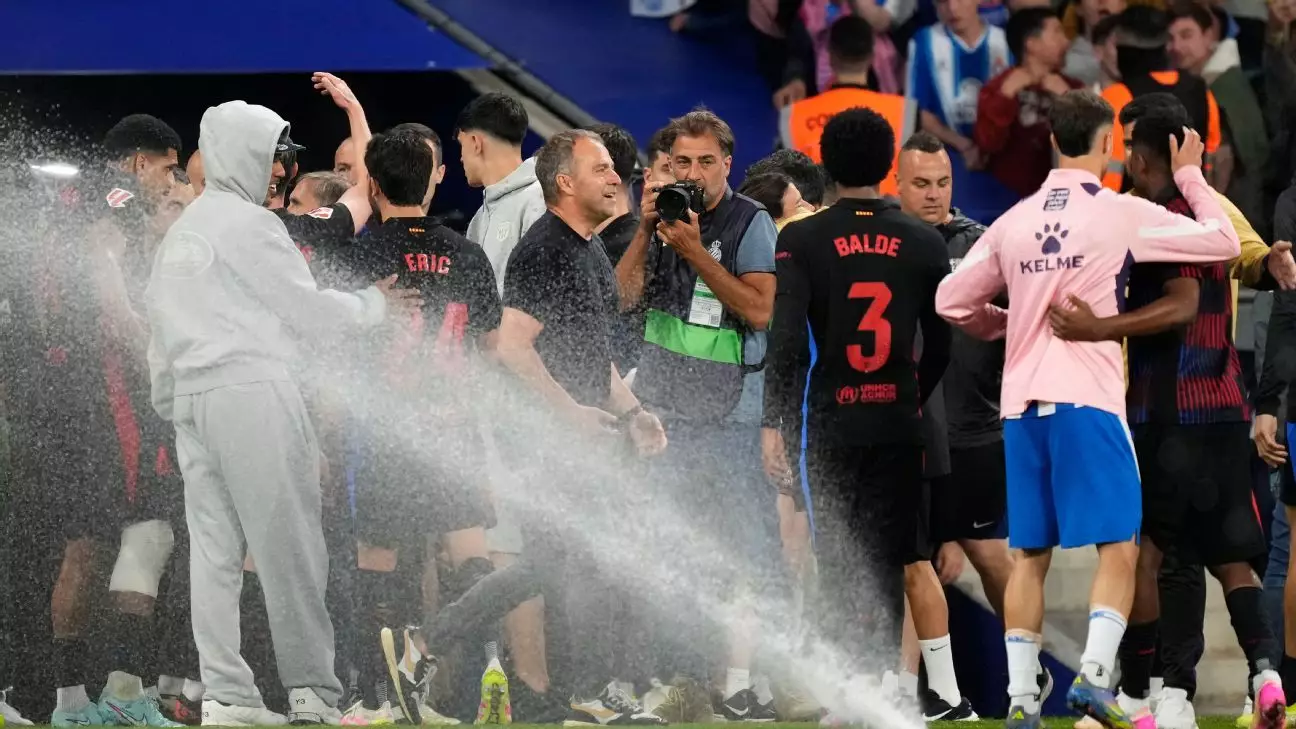In a high-stakes LaLiga match that saw Barcelona clinch its 28th league title with a 2-0 victory over city rivals Espanyol, tension was palpable. However, what truly set this encounter apart was the exemplary leadership displayed by Barcelona’s coach, Hansi Flick. As celebrations erupted, he promptly took measures to ensure that joy did not spiral into chaos, demonstrating a remarkable combination of sportsmanship and tactical wisdom. This incident provides a compelling snapshot of how strong leadership can diffuse potential conflicts while highlighting the necessity of prioritizing respect and decorum in the world of sports.
As the final whistle blew at the RCDE Stadium, Barcelona’s players surged in exuberance, their victory hard-fought and well-deserved after a long season. However, given the history of confrontations at this very venue, the atmosphere was heavy with anxiety. Just two years prior, similar scenes of jubilation had turned ugly when Espanyol fans overflowed onto the pitch, trailing the Barcelona players down the tunnel. Flick’s quick thinking ensured that history did not repeat itself; he acted decisively, ushering his squad off the field to avoid any escalation of tensions. His choices, lauded by opponents and analysts alike, illustrated a layered understanding of the emotional components of sports and a mastery of interpersonal dynamics.
A Leader’s Respect for Tradition and Rivalry
In the aftermath of the match, Espanyol’s coach Manolo González reflected on Flick’s conduct, calling him a “gentleman.” González’s statement was more than mere praise; it was a recognition of the necessity for respect on such occasions. Football is steeped in tradition and rivalry, and the emotional investment of fans can turn joyous moments into precarious ones if not handled with care. By opting to move celebrations indoors, Flick acknowledged both the significance of Barcelona’s triumph and the sentiments of the home supporters. His choice mitigated tensions, facilitating an environment that favored the sustenance of rivalry without hostility.
The match had started on a tumultuous note, marred by a serious incident outside the stadium where a car collided with fans, resulting in injuries. Such occurrences only add to the pressure on players and management, transforming a game of sport into a potential flashpoint. In this charged atmosphere, the ability of Flick to deftly navigate both the emotional and physical dynamics of the match is commendable. This is a significant lesson for not just football, but any high-stakes environment where emotions run high and the potential for conflict exists.
Strategic Decisions: Celebrations and Respect
Flick’s comment during the post-match press conference highlighted his understanding of these dynamics. He emphasized the importance of respect towards the fans and the need to avoid provocations with themes of celebration in public environments. His strategy is remarkably simple yet profound: celebration should be employee-centered and compartmentalized, existing within the context of sport, while simultaneously respecting the fervor of rivals. The significance of internal celebrations is not lost on players; they have a right to rejoice in their accomplishments but must also do so within the framework of goodwill and sportsmanship.
This victory places Barcelona seven points clear of Real Madrid, ensuring their dominance in Spanish football for this season. Flick’s leadership has not only secured titles but has also fostered a team ethos that emphasizes unity, achievement, and respect. The upcoming open-top bus parade represents a celebratory crescendo to a season that has yielded the Spanish Supercopa, the Copa del Rey, and, now, the LaLiga title. Here, Flick encourages players and fans alike to embrace the moment and reflect on what their dedication has achieved together.
Flick: The Architect of Change
In his debut season with Barcelona, Hansi Flick has proven to be not just a tactical maestro, but a transformational leader. His ability to navigate the complexities of football culture, fan expectations, and the intricate emotional landscapes of rivalry makes him a remarkable figure in the sport. While victories matter, what often determines the legacy of a coach are the values they instill within their team and the sportsmanship they exemplify.
Flick’s approach to handling the championship celebration serves as a model for future leaders in sports. By placing a premium on respect and dignity, he elevates the discourse around rivalry and competition to new heights. In doing so, he reminds us that the essence of sport extends beyond mere victory; it lies in how we honor the game, the players, and, indeed, the fans.

